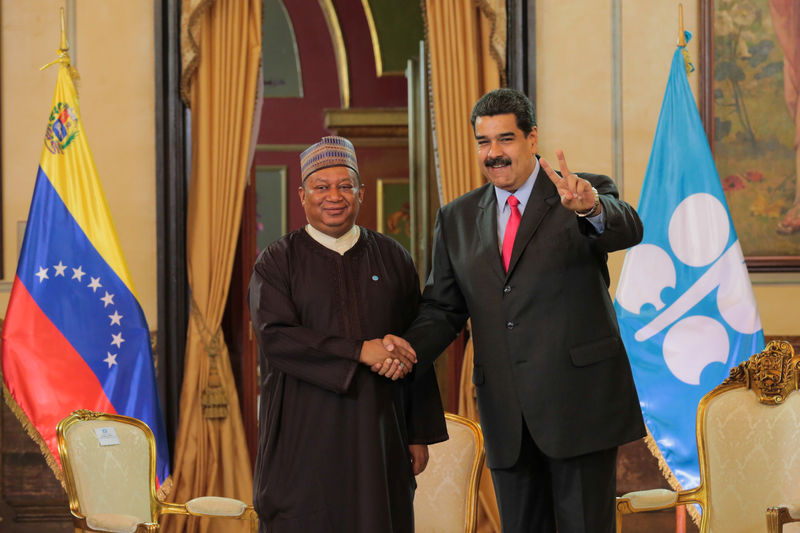By Vladimir Soldatkin and Alex Lawler
MOSCOW/LONDON (Reuters) - Venezuela's Nicolas Maduro has sought OPEC support against U.S. sanctions imposed on his country's oil industry, citing their impact on oil prices and potential risks for other members of the producer group.
But a source familiar with the matter said the Organisation of the Petroleum Exporting Countries, of which Venezuela is a founding member, had declined to make any formal statement. OPEC says it is concerned with oil policy, not politics.
More than 40 nations including the United States, European powers and most of Latin America have recognised Maduro's rival, Juan Guaido, as the country's rightful head of state, following disputed elections last year.
The request was made in a letter sent to OPEC Secretary-General Mohammad Barkindo dated Jan. 29 and seen by Reuters, a day after the United States imposed sanctions on Venezuelan state oil firm PDVSA [PDVSA.UL].
"Our country hopes to receive the solidarity and full support of the member countries of OPEC and its ministerial Conference, in the fight we are currently having against the illegal and arbitrary intrusion of the United States in the internal affairs of Venezuela," Maduro wrote.
I seek "your firm support and collaboration to jointly denounce and face this shameless dispossession of ... important assets of one of the members of OPEC", the letter said.
He wrote that OPEC should help to determine potential solutions based on "the impact that this action has on the global energy market, and the risk it represents for the other countries ... of this organisation".
The sanctions on Venezuela have boosted global oil prices, which were trading at around $62 a barrel on Monday. The move has disrupted shipments as more than 20 tankers loaded with Venezuelan oil have been anchored off the U.S. Gulf Coast.
Still, analysts say there is ample spare capacity in other oil producers such as Saudi Arabia plus strategic reserves in consuming nations to compensate for a loss of Venezuela's exports.
OPEC tends to avoid political disputes involving individual members. Last year, it declined a request from Iran for a discussion of U.S. sanctions against Tehran at a policy-setting meeting.
Venezuela was once a top-three OPEC oil producer but production has been in decline for years following the collapse of the country's economy.
Energy research and consulting firm Rystad sees Venezuelan production plummeting to 680,000 barrels per day (bpd) next year, from 1.34 million bpd at the end of 2018. Venezuela pumped 3 million bpd at the turn of the century.

Together with Libya and Iran, Venezuela is exempt from the latest OPEC-led supply cut due to the involuntary decline in production.